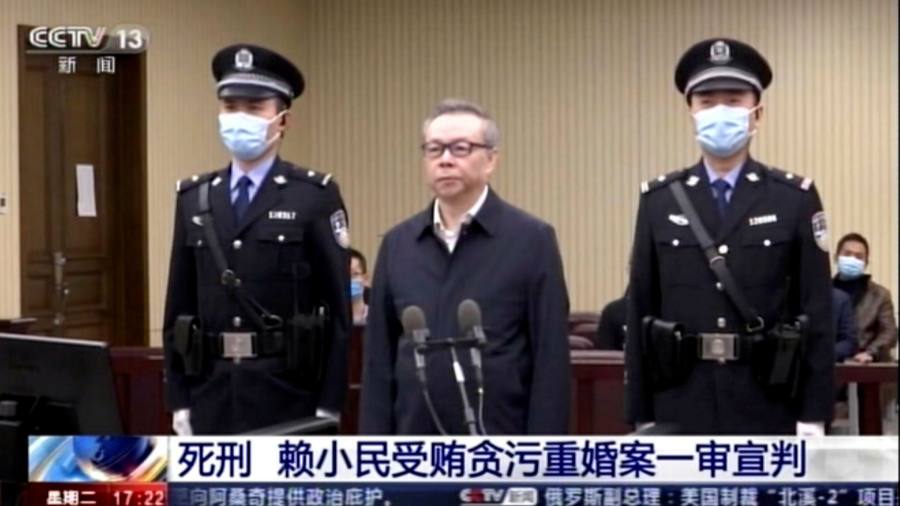[ad_1]
China has executed the former head of one of its biggest asset management companies who was convicted of corruption, a punishment that has drawn sharp criticism from international human rights experts.
The execution of Lai Xiaomin was carried out on Friday three weeks after the 58-year-old was sentenced to death by a court in the city of Tianjin, state media reported.
Lai was found guilty of taking bribes amounting to Rmb1.8bn ($280m) over a 10-year period when he worked at Huarong Asset Management and before that at the China Banking Regulatory Commission.
While experts say such punishments for financial crimes in China are rare, the court said Lai’s crimes had caused serious losses to the interests of the nation.
Sophie Richardson, China head of Human Rights Watch, said the death penalty was not defensible under any circumstance and “to impose this kind of punishment for a non-violent crime is additionally disturbingâ€.
Verdicts such as that handed down to Lai should be considered “political determinationsâ€, given China’s judiciary functions to serve the interests of the Chinese Communist party, she said.
“It is unclear whether he had access to counsel of choice, whether he had access to family members, whether he had access to the evidence as presented against him — this is a government that still has something like a 99 per cent conviction rate,†Ms Richardson added.
Lai’s death comes against the backdrop of long-running efforts by Beijing to bring under control risky elements of the financial system which it believes threaten economic stability. It follows a years-long anti-corruption campaign led by Xi Jinping, China’s president.
One person who personally knew Lai attributed the severity of the punishment to his close ties to others in China’s elite. The person suggested that officials “wanted to set him as an example to scare other corrupt officialsâ€.
“But I also feel he may have been too deeply involved in high-level politics,†added the person, who asked not to be named.
Huarong, established in the 1990s, was one of four asset management companies designed to remove some of the risks in China’s biggest state-owned lenders by taking bad debts off the bank’s books ahead of market listings.
But the groups expanded aggressively into new areas, raising more than $100bn from debt markets. Lai also took Huarong into sectors spanning from brokering and insurance to leasing and property development, ultimately drawing the attention of regulators seeking to clamp down on financial risk.
Caixin, the respected business publication, has reported that 100 properties in southern China were distributed to Lai’s former wife and to his mistresses. He was also found guilty of bigamy.
China executed 2,000 people in 2018, by far the most in the world, down from 5,000 in 2010 and 12,000 in 2002, according to estimates from Dui Hua Foundation, a rights group.
Margaret Lewis, a law professor at Seton Hall University in the US, said Lai’s execution was a “jarring†reminder that the death penalty remained a powerful weapon in China.
“Despite efforts by critics inside and outside China to curb its use, the government still uses the death penalty to send strong warnings . . . that corruption remains a central concern,†she said.
“The short time between sentencing and execution highlights longstanding concerns about how carefully death sentences are reviewed and the ability of defendants to have any shot of contesting the government’s case,†Ms Lewis added.Â
[ad_2]
Source link





